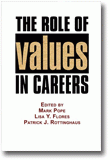
The Role of Values in Careers
Edited by:
Mark Pope, University of Missouri - Saint Louis
Lisa Y. Flores, University of Missouri - Columbia
Patrick J. Rottinghaus, Southern Illinois University Carbondale
Published 2014
Values are of critical importance in the practice of career counseling as evidenced by the pervasive use of values surveys and values card sorts by career counselors, vocational and counseling psychologists, career development facilitators, career coaches, and other career development practitioners.
The purpose of this book is to provide practitioners, faculty, and researchers in vocational psychology and career counseling with a foundational tool to guide their work. This book focuses on the critical role that values play in a person’s career, addressing values from a broad array of perspectives, including cultural and international perspectives, to illuminate the place of values within vocational psychology and career development.
The book will be directed primarily toward psychology and counselor education faculty who teach advanced undergraduate and graduate courses in vocational psychology, career development, career assessment, and career counseling. Although there is a range of readership (undergraduate and graduate students as well as professionals already in the field), the authors understand the differences in reading level and agree to write for all levels.
CONTENTS
Introduction to The Role of Values in Careers, Mark Pope, Lisa Y. Flores, and Patrick J. Rottinghaus. Section I: Overview and Historical Foundations. Work Values: A Career Construction Elaboration, Mark L. Savickas. The History of Work Values: Morals, Measurement, and Meaning Making, Paul J. Hartung. Section II: Theoretical Approaches to Values and Careers. The Role of Values in Career Choice and Development, JoAnn Harris-Bowlsbey. Assessing Work Values, Donald G. Zytowski. The Gendered Context of Career Values, Kristen M. Perrone-McGovern, Stephen L. Wright, Desiree S. Howell, and Emily Barnum. Cultural Perspectives on Values in Career Theory and Practice, Y. Barry Chung and Tiffany K. Chang. Section III: Cutting Edge Approaches in Researching Values. Qualitative Approaches to Studying Cultural Values, Neeta Kantamneni and Nadya A. Fouad. Integrating Values and Interests for Career Counseling, James Rounds and Patrick I. Armstrong. Section IV: Values and Culture. Work Values in the Lives of Diverse Individuals: Examining Race and Socioeconomic Status, Heather Z. Lyons. The Educational and Career Values of Native American Adolescents: Dispelling the Myths, Sherri L. Turner. Best Practices in Incorporating Cultural Values Into Career Education Programs: What Do We Know and How Do We Do It? Saba Rasheed Ali and Miranda Verry. Clarifications of Work and Family Values: A Basis for Better Role-Blending, Rachel Gali Cinamon and Hanoch Flum. Section V: Values in the Practice of Career Counseling. Calling in Career Development: Strategies for Promoting Meaningful Work, Bryan J. Dik and Ryan D. Duffy. DOVE (Depth-Oriented Values Extraction): Helping Clients Create Career-Life Choices, Edward A. Colozzi and Angela Byars-Winston. A Values Clarification Workshop for Undergraduate and Graduate Students, Michael Schaub. Creating a Sense of Hope: The Essence of Career Construction for Life Designing in a Developing Country Contex, Kobus Maree. Meaningful Work: An Ethical Obligation for Vocational Psychology, Michael F. Steger. Career Counseling Laboratories: Integrating Values Into Career Counseling With Gifted and Talented Students, Barbara E. Kerr. Exploring Altruistic Motives in Career Counseling, Patrick J. Rottinghaus and Steven M. Andrews. About the Authors.
-
Paperback9781623966461
Web price: $45.04 (Reg. 52.99)
-
Hardcover9781623966478
Web price: $80.74 (Reg. 94.99)
- eBook9781623966485

- BUS012000 - BUSINESS & ECONOMICS: CAREERS: General
- EDU031000 - EDUCATION: COUNSELING: Career Guidance
- EDU009000 - EDUCATION: Educational Psychology
-
 Farewell to Variables
Farewell to Variables
-
 Flourishing in Contexts and Cultures
Sociocultural Perspectives on Fostering Youth Well-Being
Flourishing in Contexts and Cultures
Sociocultural Perspectives on Fostering Youth Well-Being
-
 Hope for the Embattled Language Classroom
Pedagogies for Well-Being and Trauma Healing
Hope for the Embattled Language Classroom
Pedagogies for Well-Being and Trauma Healing
-
 Real Talk
Promoting Social Justice in Education and Psychology Through Difficult Dialogues
Real Talk
Promoting Social Justice in Education and Psychology Through Difficult Dialogues
-
 Teaching Human Development for Educators
Teaching Human Development for Educators
-
 Teaching Learning for Effective Instruction
Teaching Learning for Effective Instruction
-
 Teaching to Prepare Advocates
Teaching to Prepare Advocates

